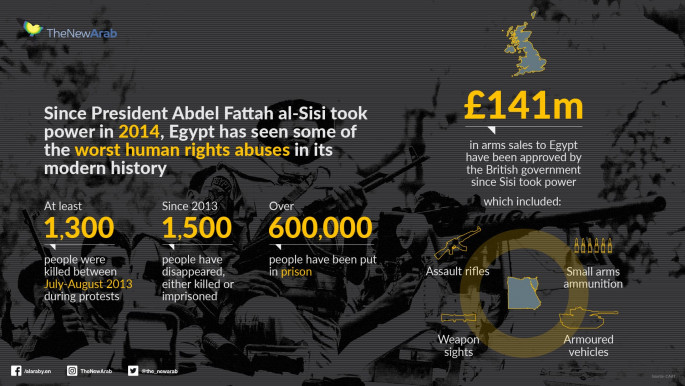Amnesty International slams Egypt's 'parallel justice system' as thousands of dissidents detained
The London-based human rights organization said the key tools of repression were the Supreme State Security Prosecution service, known as the SSSP, as well as counter-terrorism courts and special police forces.
"In Sisi's Egypt, all critics of the government are seen as potential terrorists," Amnesty's France director Katia Roux said at the launch of the 60-page report in Paris.
In its report entitled "Permanent State of Exception", Amnesty said it had observed a sharp rise in cases prosecuted by the SSSP - from 529 in 2013 to 1,739 cases last year.
The prosecution - which deals with activities deemed threats to state security - regularly probes political dissidents, including those from the Muslim Brotherhood and non-Islamist groups.
Amnesty said that it had documented "the cases of dozens of human rights defenders and peaceful critics of the government who have been brought before the SSSP".
They include Zyad el-Elaimy, a human rights lawyer and member of the Egyptian Social Democratic Party, who was arrested for attempting to co-found the "Hope Coalition", a parliamentary coalition which aimed to run in the 2020 parliamentary elections, and Abeer el-Safty, a journalist who was detained following her refusal to be coerced by the police into voting in the 2019 "Pharaoh motion" referendum.
The referendum was designed to allow Sisi to extend his rule until at least 2030 and was marked by widespread irregularities.
Philip Luther, Amnesty's Middle East and North Africa Research and Advocacy Director, warned that the SSSP had flagrantly abused its power.
|
It has "become a central tool of repression whose primary goal appears to be arbitrarily detaining and intimidating critics, all in the name of counter-terrorism," he said.
The SSSP, along with the Egyptian National Security Agency (NSA), a special police force, and counter-terrorism courts "have emerged as a parallel justice system for detaining, interrogating and trying peaceful dissidents," he said.
The report noted that many detainees are forced to languish in prison for lengthy stretches of "pre-trial detention", without any hope of a legal reprieve or of a case being opened.
"Many are detained for months and years without evidence, based on secret police investigations and without recourse to an effective remedy," it added.
Hardening repression
Amnesty said it based its findings on more than 100 interviews with former detainees and their lawyers.
It said many were held for involvement in political or human rights activities, for protesting or for sharing critical social media content.
This week plainclothes police raided, detained then released three editors at the local online news outlet Mada Masr after arresting another editor the day before.
The state security prosecution issued an order to search the news site's premises, the public prosecutor said in a Monday statement.
Also this week, a Coptic Christian rights activist was detained and ordered to be held for 15 days.
He faces charges of joining a "terror" group and spreading misinformation, his lawyer confirmed to AFP.
Read more: Sisi's brutal crackdown continues, aided by western accomplices
To remedy the mounting violations, Amnesty called on the authorities "to afford fair trial guarantees" to those arrested.
Rights groups regularly accuse Egyptian authorities of curtailing freedoms and muzzling any form of dissent including from Islamist and secular opposition.
Under Sisi, protests have effectively been outlawed in Egypt, and authorities last year also adopted a law to clamp down on social media.
A renewable state of emergency remains in force.
Authorities arrested some 4,000 people in the wake of small-scale protests in September that made calls for Sisi's removal.
The protests were prompted by revelations from Mohamed Ali, a construction contractor who said that Sisi and his family had spent money from public funds to build luxurious palaces at a time when poverty rates were rising in Egypt.
"The situation is getting worse," Roux said. "Repression is hardening."
Follow us on Twitter and Instagram to stay connected





 Follow the Middle East's top stories in English at The New Arab on Google News
Follow the Middle East's top stories in English at The New Arab on Google News


